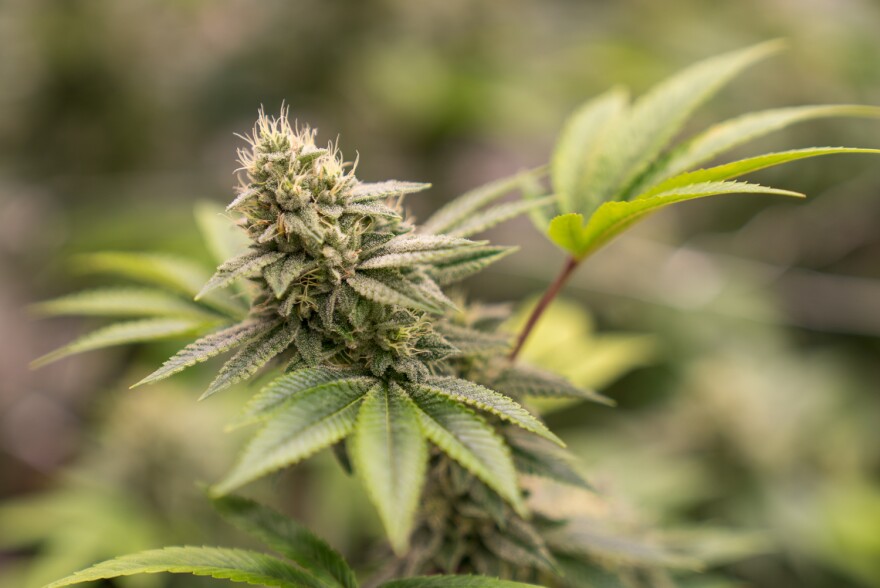The state rolled back its of nearly 15,000 cannabis products last week and allowed them to return to the dispensary shelves, after requiring Missouri companies to keep them in storage since early August.
The Missouri Division of Cannabis Regulation said in an that after a review of , regulators can verify that “some of the marijuana products on recall contain THC solely sourced from marijuana grown in the Missouri regulated market.”
The future of the other 45,000 products recalled on Aug. 14 — and those of dozens of marijuana businesses facing a steep financial loss if the products must be destroyed — is still pending.
The Robertsonville-based marijuana manufacturer Delta Extraction has the Administrative Hearing Commission to rescind the company’s license suspension and fully rollback the recall.
A trial is scheduled for the beginning of December, if the division and company can’t work out an agreement before then.
The key question is how the recalled products were created — and whether that process poses a risk to public health.
If Delta Extraction can present evidence showing the products were created safely, then there’s a possibility the state won’t order 45,000 products to be destroyed. The company could still likely face a hefty fine, and even license revocation, for into the state and adding it to Missouri-grown marijuana products.
The commissioner overseeing Delta’s appeal of the recall and license suspension issued a on Oct. 25 that will allow some records in the case to be closed and confidential.
Those records could include “trade secrets or financial and proprietary information,” the order states, as well as the division’s investigations of other licensees.
The imported product
At the center of the recall is a THC concentrate, or distillate, made partially from hemp.
In August, the state accused the company of adding “hemp-derived chemically modified ‘converted’ cannabinoids” to marijuana products.
Unlike marijuana, hemp has very little psychoactive properties naturally — which is why it was taken off the federal controlled substance list in the 2018 farm bill. But since then, businesses have been in a race to create ways to produce the most predominant psychoactive active element in marijuana, delta-9 THC, using the hemp plant.
The most common way to get delta-9 THC from hemp is usually a chemical conversion process from CBD, which is the more common cannabinoid in hemp.
it’s a process that could involve a variety of chemicals that Missouri marijuana labs don’t test for – making the labs unable to verify the product’s safety.
And because hemp is no longer a controlled substance, no agency in Missouri or in the federal government is monitoring the production of chemically converted THC from hemp.
However, the lab in Florida where Delta bought a good amount of product that its distillate wasn’t created using harsh chemicals, as the state suspected, but rather through the same extraction process employed in the regulated marijuana market.
J.J. Coombs, owner and CEO of Arvida Labs in Fort Lauderdale, walked The Independent through the process to make the concentrated THC-A, which isn’t intoxicating unless you heat it up, at which point it turns into delta-9 THC.
For example, won’t produce a high because there’s only a small amount of delta-9 THC but a lot of THC-A.
It’s a fairly new process, Coombs said, that involves breeding hemp plants to have higher concentrations of the potentially intoxicating property THC-A.
Hemp has very little THC-A, so it takes about 90 pounds of hemp to make 1 kilo of THC-A isolate, or powder, Coombs said.
The confusion about Arvida Labs’ product being made using a chemical conversion process is understandable, Coombs said, because most people don’t know labs can extract large amounts of THC-A from the hemp plant.
It’s a process neither the state nor Delta leaders could explain during the company’s appeal proceedings, regarding how it’s different from the CBD conversion process.
Delta’s leadership testified the conversion process was being used, at one point, with its products — a revelation that who purchased Delta’s distillate and thought it was made with 100% marijuana.
Chemicals from this process is one concern, lab experts said, but another is the possibility that the hemp came from outside the United States — meaning they could contain foreign pesticides that cannabis labs don’t test for.
Coombs said Arvida purchased the hemp from farmers in Texas, Tennessee and Kentucky who’ve learned to breed the plants to have higher concentrations of THC-A, using federally-approved strains. Any of the pesticides used in those states would have shown up on a lab test as being safe, Coombs said.
Green Precision Analytics is one of the labs that Delta Extraction used to test the distillate at the heart of the recall. Anthony David, the lab’s owner and chief operating officer, told The Independent previously that he had no idea Delta was incorporating imported hemp in the products.
David also said there was no trace of the THC coming from a chemical conversion process. Usually he can see a difference in curves of the chromatography, David said, but he didn’t in this case. Coombs said that’s because it was done through a normal extraction process.
Coombs said that marijuana companies who purchased Delta’s distillate should not feel “duped” because the same extraction process used to get delta-9 THC from marijuana was used to get THC-A from hemp.
“It’s the same exact thing,” he said. “There’s no difference. Hemp is cannabis, just with no delta-9 THC.”
This story was originally published by the , part of the States Newsroom.






